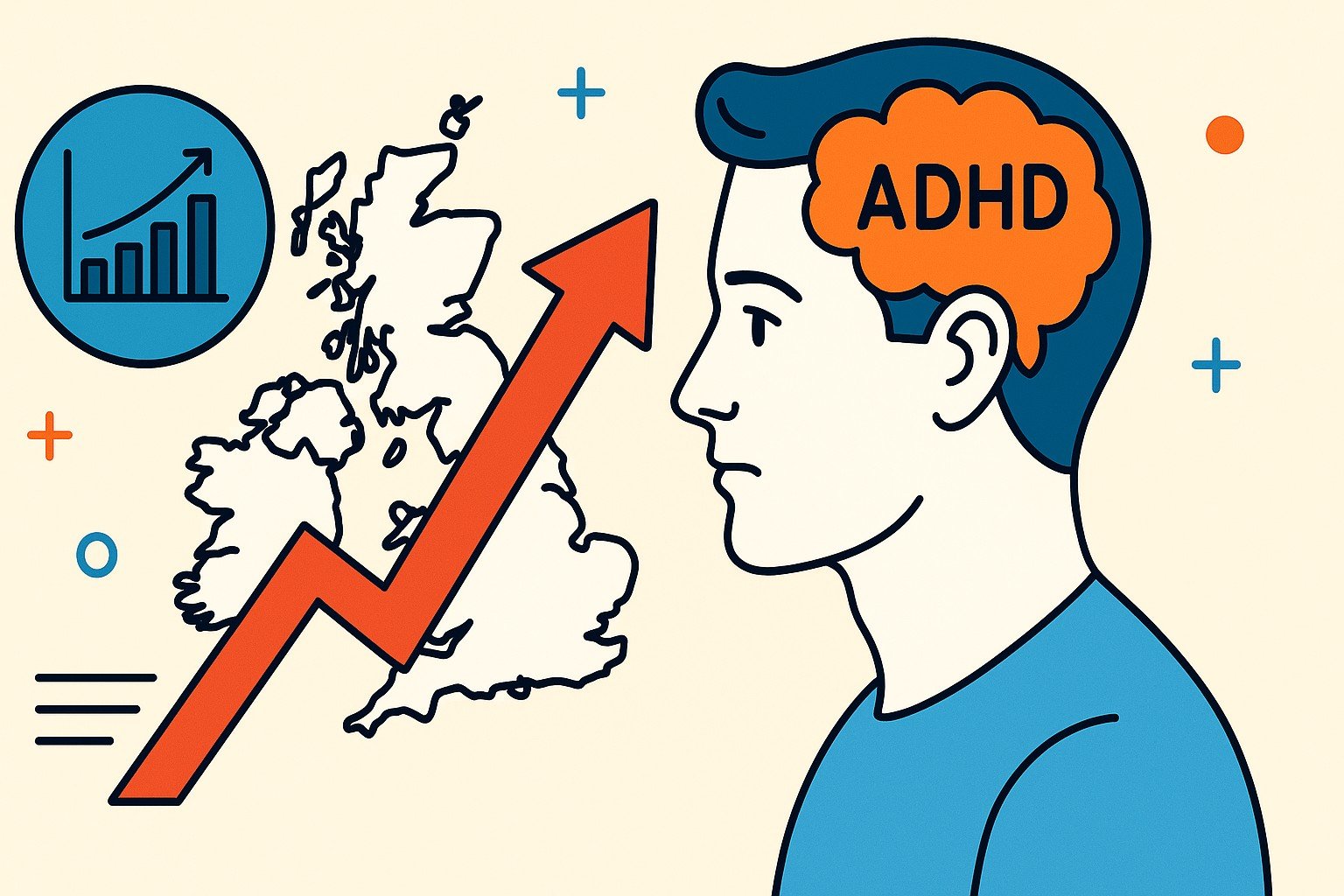📊 Adult ADHD in the UK – Statistics and Diagnostic Rates
Just as mental health awareness has increased, so too has the understanding of Adult ADHD in the UK. Understanding the diagnostic rates and the challenges faced by adults living with ADHD is necessary for you to grasp the significance of this condition. With studies revealing that up to 5% of adults may experience ADHD symptoms, it’s vital to explore the factors influencing diagnosis and treatment. This blog post will provide you with insightful statistics and an overview of the current landscape regarding Adult ADHD in the UK.
Adult ADHD in the UK Stats and Diagnosis
Key Takeaways:
- The prevalence of adult ADHD in the UK is estimated at around 2.5% to 4% of the adult population, indicating a significant number of adults may be affected.
- Diagnostic rates have seen an increase in recent years, partly due to heightened awareness and changes in diagnostic criteria.
- Many adults with ADHD remain undiagnosed or misdiagnosed, leading to ongoing challenges in various aspects of life, including work and relationships.
- Access to assessment and treatment can vary widely across different regions of the UK, often resulting in long waiting times for services.
- ADHD can co-occur with other mental health conditions, complicating diagnosis and treatment, making comprehensive care crucial.
Overview of Adult ADHD
While attention-deficit/hyperactivity disorder (ADHD) is often associated with children, it is increasingly recognised as a significant issue in adults. Adult ADHD can profoundly affect your daily life, impacting your ability to maintain relationships, manage your job, and handle everyday tasks. Awareness and understanding of this condition are vital for providing support and treatment options for those affected.
Definition and Symptoms
At its core, adult ADHD is characterised by persistent patterns of inattention, hyperactivity, and impulsiveness. You may find it challenging to concentrate, stay organised, or manage time effectively. Other symptoms can include forgetfulness, restlessness, and difficulty in regulating emotions, which can lead to various life complications.
Prevalence in the UK
An estimated 2.5% of adults in the UK have ADHD, which translates to approximately 1.5 million individuals. This statistic highlights that ADHD is more common than many might realise, prompting a need for greater acceptance and understanding of the condition within society.
In fact, the prevalence of adult ADHD can lead to significant challenges in personal and professional life. Many adults are undiagnosed or misdiagnosed, which can exacerbate mental health issues such as anxiety and depression. Increasing awareness and access to diagnostic services is imperative, as timely intervention can improve quality of life and functioning for those affected. Understanding the prevalence is the first step towards addressing the challenges associated with this condition.
Diagnostic Rates
Some studies estimate that only a fraction of adults with ADHD in the UK have received a formal diagnosis. The inconsistency in awareness and understanding of ADHD among clinicians can lead to missed diagnoses, which in turn affects the support available for those who need it.
Current Statistics
Before 2023, it was estimated that around 2.5% of adults in the UK were diagnosed with ADHD, indicating a significant number of undiagnosed individuals who may struggle without appropriate support. These statistics suggest an urgent need for improved diagnostic rates.
Comparison with Global Rates
About 5% of adults worldwide have been diagnosed with ADHD, indicating that the UK might be underdiagnosing. The substantial gap between the UK rates and global figures highlights the challenges in recognising and diagnosing ADHD here.
Global ADHD Diagnostic Rates
| Country | Estimated Diagnostic Rate |
|---|---|
| United Kingdom | 2.5% |
| United States | 4.4% |
| Australia | 3.5% |
| Canada | 4.5% |
Rates of ADHD diagnosis vary significantly across the globe. For instance, in the United States, rates are nearly double those in the UK. This disparity may be attributed to differences in healthcare systems, levels of awareness, and the availability of resources for diagnosis and treatment. This emphasises the need for increased awareness and identification of ADHD within your own community to ensure that those in need receive proper care.
Factors Influencing Diagnosis
Once again, various elements can profoundly affect the diagnosis of adult ADHD. Key factors include:
- Awareness of symptoms
- Access to mental health services
- Bias in the diagnostic process
- Stigma surrounding mental health
The interplay of these factors can either facilitate or obstruct the timely identification of your condition.
Age and Gender Differences
About the diagnosis of ADHD, significant variations exist across age and gender. Men are typically diagnosed at a higher rate than women, often owing to differing symptom presentations. Furthermore, diagnosis rates can also diverge between age groups, with younger individuals being more frequently assessed than older adults.
Socioeconomic Impacts
Behind every diagnosis of ADHD lies a narrative influenced by socioeconomic factors. Your financial stability and educational background can significantly affect your access to vital diagnosis and treatment.
Hence, the socioeconomic impacts of ADHD can be profound. Individuals from lower socioeconomic backgrounds may face barriers in accessing diagnostic services, resulting in late identification of ADHD. This can exacerbate issues such as poor academic performance and low self-esteem. Conversely, those with better resources can seek timely assessments, potentially leading to more favourable outcomes. Ultimately, understanding how socioeconomic factors shape your diagnosis can encourage advocacy for improved mental health services across all demographics.
Treatment Options
To effectively manage adult ADHD, a variety of treatment options are available. These options often combine medication, therapy, and support services tailored to your specific needs. Collaborating with healthcare professionals can help you determine the most suitable approach for improving your daily functioning and overall quality of life.
Medication
An array of medications can be prescribed to help manage ADHD symptoms. Commonly, stimulants are used, as they can improve focus and reduce impulsivity. However, non-stimulant medications are also available, which may be preferable for some individuals based on their specific health circumstances and responses to treatment.
Therapy and Support Services
Between medication and therapy, a comprehensive approach can significantly enhance your coping strategies. Therapeutic options may include cognitive behavioural therapy (CBT), which helps you recognise and change negative thought patterns, and skills training to improve time management and organisational skills.
In fact, these therapy and support services can be particularly vital in addressing the emotional challenges associated with ADHD. Participating in self-help groups or support networks can foster a sense of community, allowing you to share experiences and learn from others facing similar difficulties. With the right support, you can develop effective strategies to manage your symptoms and improve your relationships, both personally and professionally.
Challenges in Diagnosis and Treatment
Unlike many other neurological conditions, ADHD in adults often remains underdiagnosed and misunderstood. This can lead to individuals experiencing significant challenges in obtaining a proper diagnosis and subsequently accessing effective treatment. Many healthcare professionals may overlook symptoms, attributing them to other issues, which can prolong suffering and impede your ability to seek help.
Stigma and Misunderstanding
Before you seek a diagnosis for adult ADHD, you may encounter widespread stigma and misunderstanding surrounding the condition. Many people still perceive ADHD as a childhood disorder, making it difficult for adults to feel validated in their experiences. This societal misconception can deter you from pursuing assessment, leading to feelings of isolation and frustration.
Access to Healthcare
Between your desire for support and the healthcare system’s ability to provide it, access to proper ADHD assessment and treatment can be a daunting hurdle. With limited resources, long waiting times, and the need for a specialist’s involvement, obtaining a diagnosis often takes substantial time and effort.
For instance, while you may recognise the signs of ADHD in your daily life, accessing appropriate services can feel overwhelming. The availability of mental health professionals trained in adult ADHD varies significantly across the UK, which may leave you waiting for months or even years for a consultation. In some areas, you might find that the needed support services are either non-existent or severely under-resourced, further complicating your journey towards effective diagnosis and treatment.
Recent Research and Findings
Many recent studies have illuminated the prevalence and impact of ADHD in adults within the UK. Research suggests that the disorder is often underdiagnosed, with many individuals lacking access to appropriate assessment and treatment. As public awareness grows, the conversation surrounding adult ADHD is expanding, highlighting the need for comprehensive diagnostic tools and tailored interventions.
Studies on ADHD in Adults
Above all, numerous studies targeting adults with ADHD have identified significant co-occurring conditions, such as anxiety and mood disorders. These findings emphasise the complexity of diagnosing ADHD in adults and the importance of a holistic approach to assessment and treatment.
Implications for Future Diagnosis
Recent research indicates that the diagnostic criteria for ADHD in adults may require revisions to accurately reflect the condition’s manifestations in this demographic. You may find that improved diagnostic guidelines could enhance identification rates and lead to better support for those affected.
A re-evaluation of the diagnostic criteria is necessary to ensure that you and others receive the appropriate recognition of ADHD symptoms throughout adulthood. Stricter guidelines could potentially eliminate misdiagnoses, driving more effective treatment options your way. Additionally, the implementation of standardised assessment tools could streamline the diagnostic process, ensuring that early intervention becomes the norm rather than the exception. Recognition of the disorder’s impact can ultimately foster a more supportive environment for individuals navigating their lives with ADHD.
Conclusion
Conclusively, understanding the statistics and diagnostic rates of adult ADHD in the UK can significantly impact your awareness and approach to this condition. As you probe into the data, you’ll recognise that ADHD affects many adults, yet it remains underdiagnosed. By acknowledging these figures, you can advocate for better recognition and support for yourself or others who may be struggling with ADHD, ultimately leading to improved quality of life and management strategies.
FAQ
Q: What is the estimated prevalence of adult ADHD in the UK?
A: Recent studies indicate that the prevalence of adult ADHD in the UK is approximately 2.5% of the adult population. This means that around 1 in 40 adults may be affected by this condition. However, awareness and understanding of ADHD can vary significantly, resulting in underdiagnosis in some cases.
Q: How is adult ADHD diagnosed in the UK?
A: Diagnosis of adult ADHD in the UK typically involves a comprehensive assessment by a qualified mental health professional. This may include a detailed clinical interview, self-report questionnaires, and often involves gathering information from family or significant others. The assessment aims to evaluate symptoms of inattention, hyperactivity, and impulsivity that have persisted since childhood.
Q: Are there any statistics on the age of diagnosis for adults with ADHD?
A: Statistics suggest that many adults are diagnosed with ADHD later in life, often in their 30s or 40s. This delay in diagnosis may be due to a lack of awareness, both among healthcare providers and individuals themselves, leading many to live with undiagnosed symptoms for years. Studies show an increasing trend in diagnoses as awareness grows and more individuals seek help.
Q: What barriers do adults face in obtaining a diagnosis of ADHD in the UK?
A: Adults seeking a diagnosis of ADHD in the UK often encounter several barriers. These include stigma and misunderstanding surrounding mental health issues, lack of access to specialist services, long waiting times for assessments, and insufficient awareness among general practitioners about adult ADHD. These factors can contribute to many adults not receiving the diagnosis and treatment they need.
Q: How has the perception of ADHD in adults changed in recent years?
A: In recent years, there has been a notable shift in the perception of adult ADHD in the UK. Greater public awareness, combined with increasing coverage of mental health issues in the media, has led to more individuals seeking diagnosis and support. Furthermore, professional training on ADHD has improved, leading to better recognition of the condition among healthcare providers. Despite this progress, challenges still remain regarding widespread acceptance and understanding of adult ADHD.








